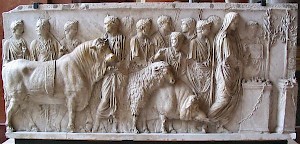Lustrum
Lustrum: the ritual cleansing of the state performed by the Roman censors.

When the Romans spoke about a lustrum, they could mean two things: the ritual cleansing of the state, which was performed every five years; and a period of five years. The double meaning is not unlike the Greek "Olympiad", which referred to a religious festival that took place every four years, and to an interval of four years.
The ritual cleansing of the Roman people was performed by one of the two censors. These magistrates were responsible for the public moral and had to put out to tender projects that were to be financed by the state. These activities were regarded as some sort of new foundation of the finances and morals of the state, and therefore, the Romans found this a fitting moment to celebrate the renewal of all public affairs. They were making a new start, and therefore, the entire nation (or a representative part) was ritually cleansed.
The ceremony itself was simple. Three animals (a bull, a sheep, a pig: together called suovetaurilia) were led around the people, who were assembled on the Field of Mars, by people with luck-bringing names (e.g., people surnamed Felix or Dives, "happy" or "rich"). This was probably meant to ward off evil. After this, the animals were sacrificed to Mars, originally a fertility god. They were completely burned. Similar purification rituals are known from other ancient nations, like the Macedonians and Persians.
After the sacrifice, the magistrates swore that the Roman people would give a similar sacrifice to the gods if they would protect them for the next five years.